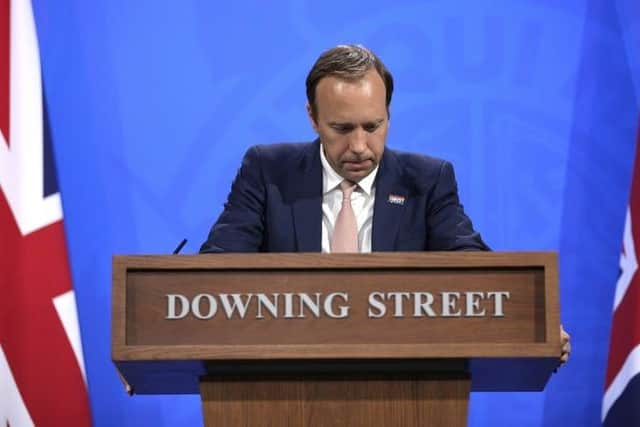Upto five more cases of Indian variant recorded in Doncaster
and live on Freeview channel 276
Health Secretary Matt Hancock said up to three-quarters of new coronavirus cases nationally are the Indian variant, though he stressed the vaccines are helping to keep hospital admissions down.
Public Health England has been tracking the spread of the B.1.617.2 mutation – which originated in India – by testing positive Covid-19 cases across the country for an "S-gene".
Advertisement
Hide AdAdvertisement
Hide AdThe gene is not present in the dominant Kent variant, which was responsible for a surge in cases over the winter, but is present in other variants of concern, including those from India.


Scientists have determined that the vast majority of the S-gene specimens identified across England are the Indian variant.
PHE data shows five positive cases of the S-gene were identified in Doncaster by May 25, from samples taken in the week to May 21.
This came after the health body identified three cases the week before.
Advertisement
Hide AdAdvertisement
Hide AdThe majority of areas in England have now reported at least one case.
The data shows 11,403 S-gene positive cases were recorded in England between the start of March and May 25.
Of these, 269 (2%) were in Yorkshire and The Humber – the third smallest proportion of England's nine regions, and well behind the North West, where there were around 5,700 cases.
Recent PHE analysis found that the proportion of confirmed Indian variant specimens among S gene positives nationally is 97%.
Advertisement
Hide AdAdvertisement
Hide AdDuring a recent Downing Street press conference, Mr Hancock said: "The latest estimates are that more than half and potentially as many as three-quarters of all new cases are now of this variant.
"As we set out our road map we always expected cases to rise, we must remain vigilant.
“The aim, of course, is to break the link to hospitalisations and deaths so that cases alone no longer require stringent restrictions on people’s lives.”
PHE figures show 6,959 cases of the Indian variant of coronavirus had been confirmed across the UK by May 26 – a rise of 3,535 on the previous week.
Advertisement
Hide AdAdvertisement
Hide AdMr Hancock said the increase in cases of the Indian variant remained focused in “hotspots” – such as Bolton, Bedford and Blackburn with Darwen – where surge testing and vaccinations were taking place.
Separate PHE data shows that the majority of people with the Indian variant have not been vaccinated, with those who had received both doses accounting for just 3% of cases between February 1 and May 25.
Over the same period there were 12 deaths linked to the variant, of which eight were among the unvaccinated.
However, Professor Christina Pagel, from University College London and a member of Independent Sage, an independent group of scientists providing Covid avice, says the planned easing of all coronavirus restrictions on June 21 should be delayed.
Advertisement
Hide AdAdvertisement
Hide AdShe told BBC Radio 4’s Today programme: “I think what’s demoralising is having a third wave.
“If we can just delay international travel, delay stage four of the road map until we have a much higher proportion of people vaccinated with two doses, we’re in a much, much better position.
“We’re only two months away from that, it’s not long to wait. What I don’t want is for us to have new restrictions.”
Comment Guidelines
National World encourages reader discussion on our stories. User feedback, insights and back-and-forth exchanges add a rich layer of context to reporting. Please review our Community Guidelines before commenting.